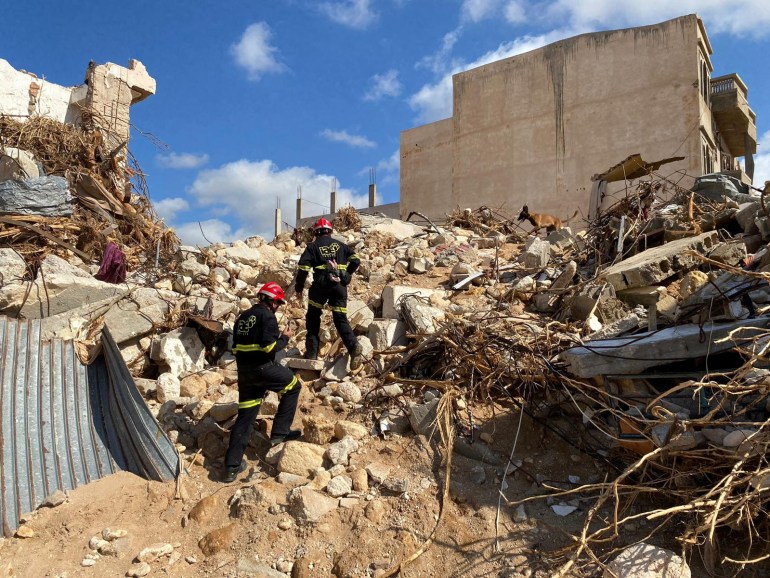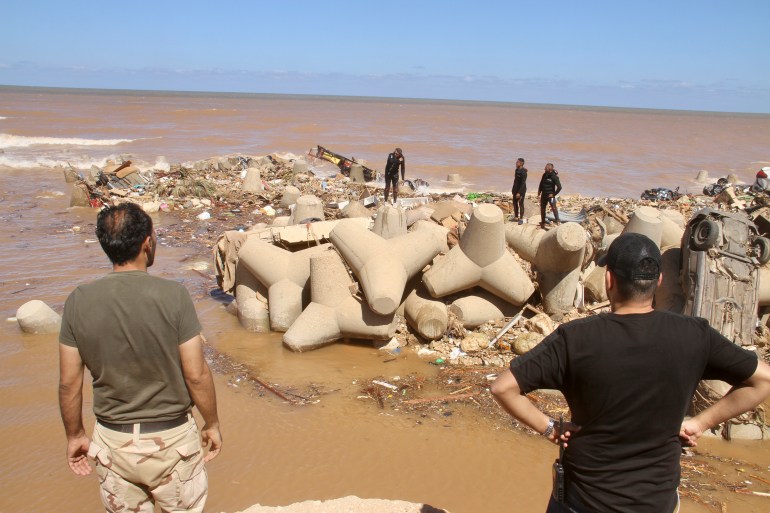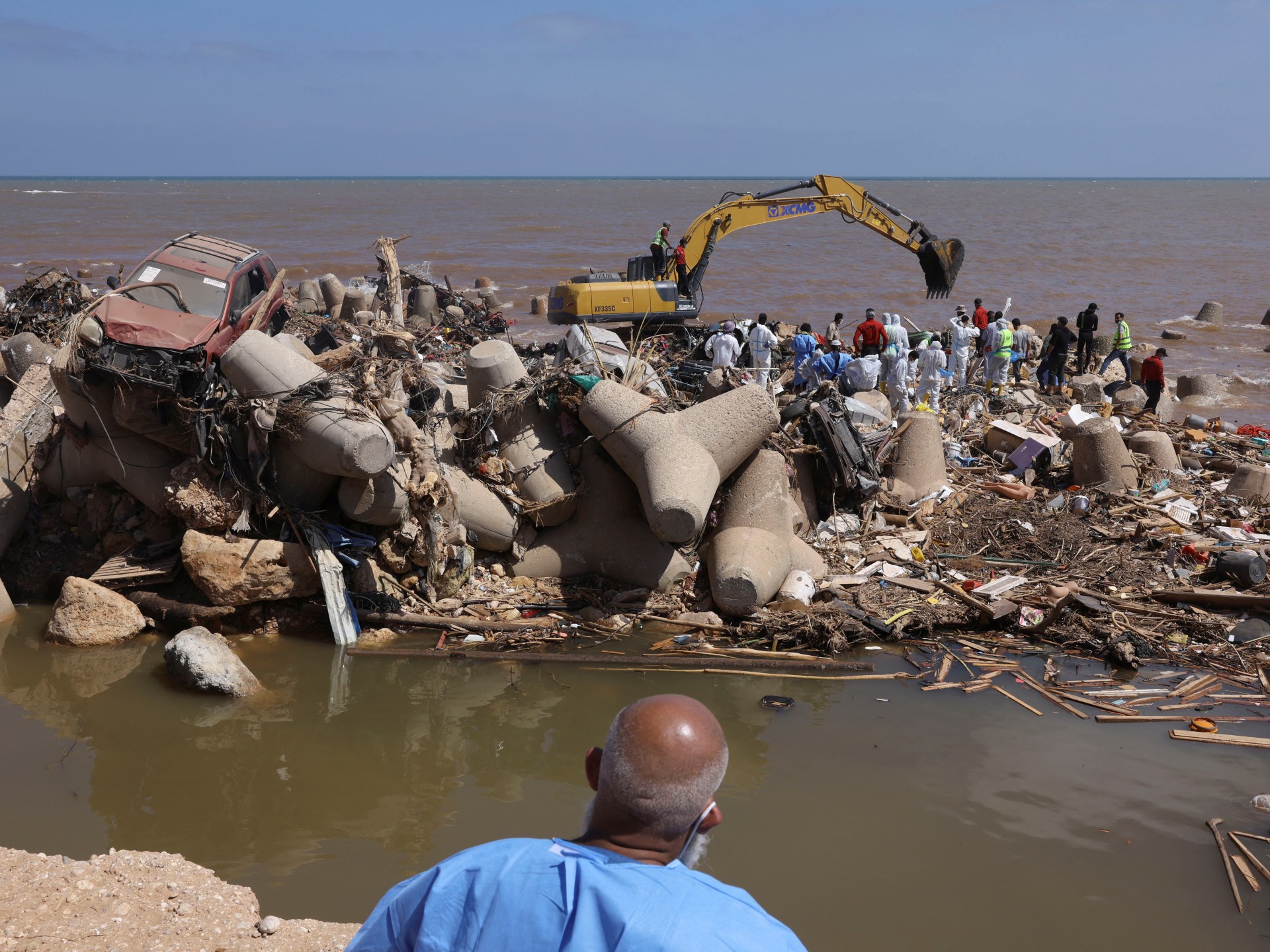A desperate search for the missing continues in the Libyan city of Derna, where bodies are still washing up on its shores or decaying under rubble nearly a week after Storm Daniel triggered devastating floods in the country’s east, which has suffered years of neglect amid political divisions.
The International Organization for Migration’s mission in Libya has said that more than 5,000 people are presumed dead, with 3,922 deaths registered in hospitals. The Libyan Red Crescent on Friday put the death toll at more than 11,000, while thousands remain missing.
Nearly 40,000 people have been displaced in the wake of the disaster, which was compounded by the bursting of two ageing dams.
Al Jazeera’s Mohamed al Bakkali, reporting from Derna, said at least 10 bodies had been recovered on Saturday morning. “Chances of finding any survivors are very slim. Instead, rescuers are finding more bodies than survivors,” he said.
Kamal Al-Siwi, an official in charge of missing people in Libya, said more than 450 bodies had been recovered in the past three days from the seashore, including 10 from under rubble.
“The work is ongoing and is very, very, very complicated,” he told the Reuters news agency. “This operation, in my opinion, needs months and years.”
At Derna’s seafront on Saturday – where a wrecked car could be seen perched on top of concrete storm breakers and driftwood was strewn across muddy pools – diggers worked to clear the path for rescue teams and a helicopter scanned the sea for bodies.
Entire districts of Derna, with an estimated population of at least 120,000, were swept away or buried in brown mud after two dams south of the city broke on Sunday night, unleashing torrents of floodwater down a usually dry riverbed.
“We were all taken by surprise. We never expected such a catastrophe,” Derna resident Khalid told Al Jazeera. “I lost my young daughter. May God accept her and have mercy… we are helpless. God almighty is our rock.”

Turkey-based journalist Nour El Jebri, who hails from Derna, said dozens of her family members were stuck on the roof of their two-storey house for a whole night as water from the collapsed dam inundated their house.
“It was a very tragic night. They could hear people shouting and screaming… as the water took them towards the sea. They were helpless,” El Jebri told Al Jazeera from the Turkish city of Istanbul. “My family is not in a very good mental state.”
International aid
International aid is beginning to arrive in flood-hit regions from the United Nations, Europe, Russia and Middle Eastern countries.
The World Health Organization said on Saturday it had flown in enough emergency aid to reach nearly 250,000 people affected by Storm Daniel across eastern Libya, including essential medicines, surgery supplies and body bags for the deceased. The UN humanitarian affairs office has launched an appeal for $71m for those affected.
Saudi Arabia announced the departure of its first aid flight to Libya and Russia said the third of its aid flights had arrived carrying a mobile hospital.
Meanwhile, an Italian naval ship docked in Derna with supplies including tents, blankets, water pumps and tractors, Italy’s Embassy in Libya said, posting photos of smaller vessels bringing equipment ashore.

Rescue and reconstruction will be a challenge as Libya, which descended into armed conflict following the overthrow of Muammar Gaddafi in 2011, is now run by two administrations – one based in the capital Tripoli and another administration in the country’s east.
Renegade commander Khalifa Haftar, who backs the eastern administration, visited Derna on Friday. His forces have now allowed entry to aid convoys dispatched by the rival government in a sign of cooperation to ensure aid gets to where it’s needed.
Caroline Holt, the director of disaster, climate and crises at the International Red Cross, said the presence of land mines across Libya due to the ongoing civil war will be one of several challenges in trying to get aid to those affected by the floods.
“We know that there will be security issues on the ground such as unexploded landmines. When a flood this size comes through and disturbs the earth, to the extent that this one has, those landmines, that may once upon a time had been mapped clearly and we understood the location of them, now all of that will be disturbed,” she told Al Jazeera.
